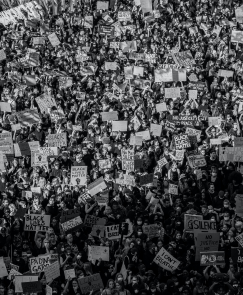
Photo by Matthew Murphy, courtesy of Dorrance Dance.

Photo by Matthew Murphy, courtesy of Dorrance Dance.
Dorrance Dance's SOUNDspace, choreographed by Michelle Dorrance.
The Rockefeller Brothers Fund (RBF) is committed to becoming an anti-racist, anti-sexist institution where each person, in their uniqueness, knows they are valued and belong. Diversity, equity, inclusion, and belonging are critical to our mission of advancing a more just, sustainable, and peaceful world.
The RBF strives to model the change we seek in the world; therefore, we are engaging in continuous learning to inform the transformation of our organizational practices, policies, and norms. We are dedicated to achieving internal racial and gender equity through an organizational culture that seeks to identify and undo any vestiges of white supremacy and patriarchy while honoring each person’s lived experiences.
We define diversity as including, but not limited to, individual and group differences based on race, ethnicity, nationality, age, gender expression, sexual orientation, class, religious belief, political perspective, and mental and physical ability. The RBF cannot realize the true value of diversity without genuine inclusion in which all members of our community feel they belong. When people know they belong, we advance on the path of equity: the continuous pursuit of impartial and fair conditions for human fulfillment.
As our learning continues, RBF trustees and staff are committed to the following actions, centering our efforts on Black, Indigenous, Latinx, and Asian people; women; and people who are gender-nonconforming:
As a global philanthropy, we seek to advance justice and equity in the places where we work, recognizing that the barriers differ in each place. As an American foundation, we accept particular responsibility to address racial and gender inequity and injustice in the United States while also being attentive to the racial and neocolonial implications of certain historic and current U.S. global policies.
The RBF acknowledges the tensions embedded in the privileges and inequities inherent in the history of philanthropy—we owe our existence to massive concentrations of wealth. We understand that, during our 80-year history, the RBF may have contributed to the perpetuation of injustice even while accomplishing much good in the world.
We believe the RBF has a moral obligation to do our part to address past and current injustices to groups that have been historically oppressed and excluded socially, politically, and economically. This includes confronting the history of white supremacy, racism, and misogyny and addressing the ways that this history shapes the field of philanthropy and the RBF.
Advancing racial, gender, and social justice is a moral imperative of the RBF and central to our institutional effectiveness and impact. It is a continuous transformational process that must occur on the personal, organizational, and societal levels. It is not work that is ever fully complete. Achieving fundamental change requires deep introspection, active listening, and focused learning about the lived experiences of people who are Black, Indigenous, Latinx, Asian, women, gender-nonconforming, and otherwise underrepresented.
We acknowledge that we have much work to do to achieve our goals and we welcome lessons learned by others who are making the journey alongside us. In the end, we all need to belong.
The RBF updates its staff and trustee demographic information each year in the Annual Review.

After the 2016 U.S. presidential election, the RBF began re-examining the roles race, gender, and power play in our organizational culture. We undertook an ongoing curriculum of learning on bias, microaggression, and white supremacist patriarchal culture and conducted an institution-wide race and gender equity audit to expose and address bias in our institution. A Diversity, Equity, and Inclusion Task Force established in 2020 now supports leadership in the implementation of new initiatives to advance equity. Read more.
The RBF set a goal in March 2020 to invest 25 percent of its endowment with firms majority-owned by women and/or people of color, with a special emphasis on people of color underrepresented in the investments sector. This goal is part of a suite of efforts the RBF is undertaking to support a more diverse finance sector and incentivize the creation of new opportunities for women and people of color in investment firms and venture capital and private equity funds. Read more.

The Racial Justice Initiative (RJI) was established in June 2020 with three-year, $10 million commitment to make catalytic grants that help organizations envision, advocate for, and implement structural change that advances racial justice in the United States. Read more.
